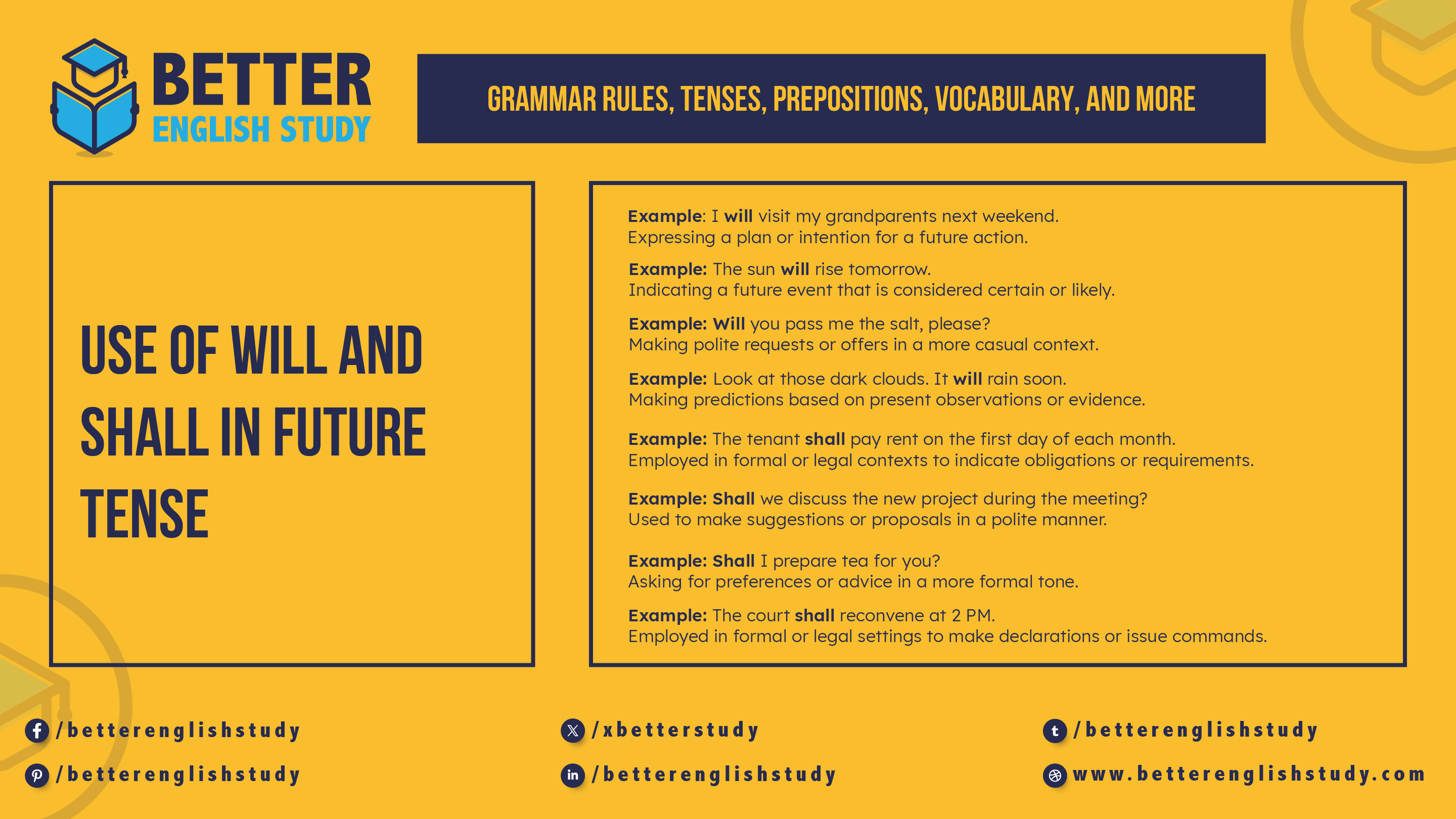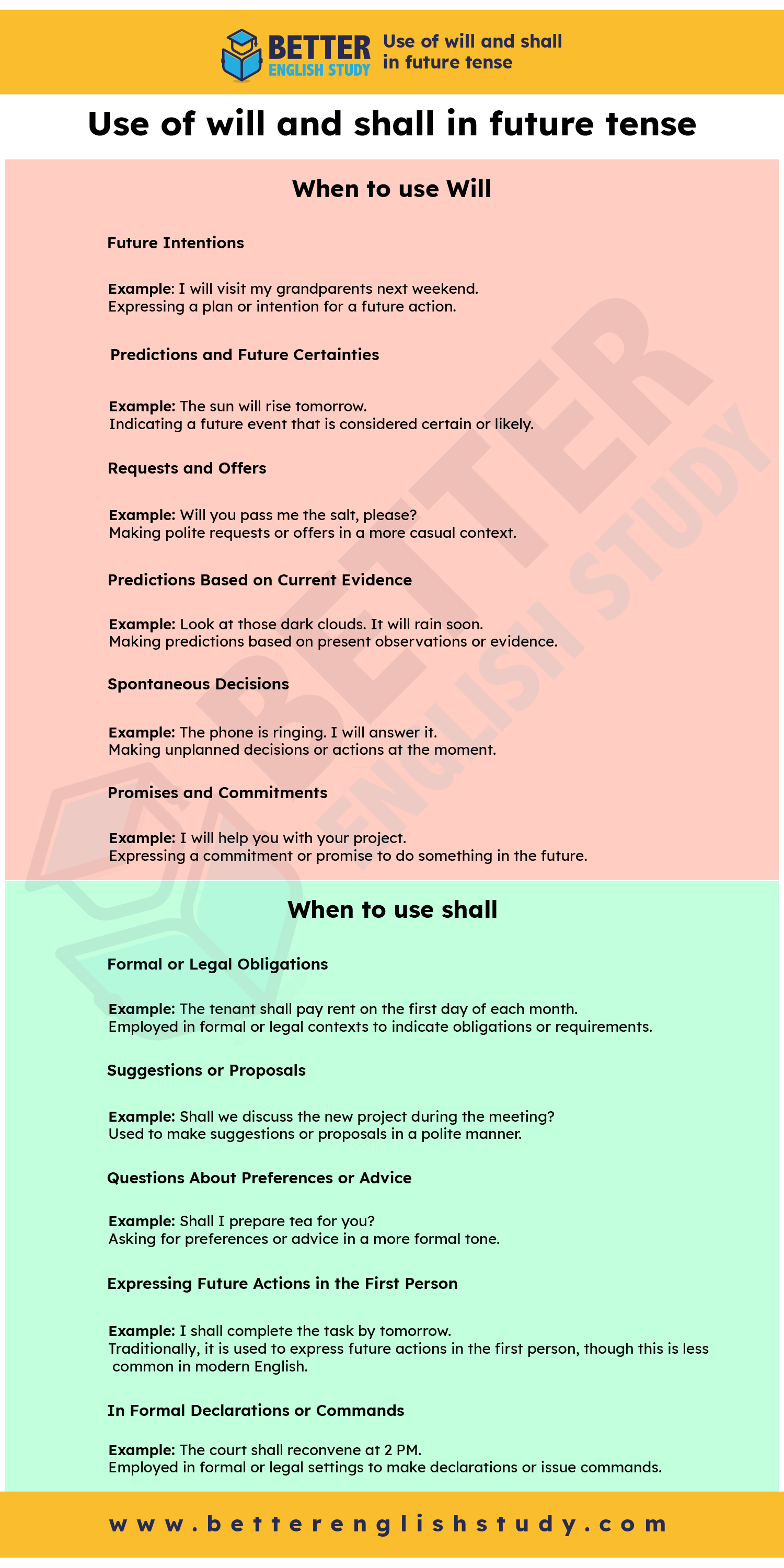
Understanding the nuances between “shall” and “will” is crucial for English learners.
In this post, we’ll explore when to use these words, shedding light on their distinctions to make your English journey smoother.
Shall vs will- What is the main difference
“Shall” and “will”, both classified as auxiliary verbs, play crucial roles in expressing specific meanings when used with other verbs. While they are often considered interchangeable, subtle differences exist.
Let’s explore these auxiliary verbs’ nuances and practical usage in forming future tense.
Understanding the Basics
“Shall” and “will”, both classified as auxiliary verbs, work alongside other verbs to convey specific meanings. “Will” is commonly utilized to express determination, inclination, or capability, as seen in examples like “He will achieve his fitness goals” or “Students will excel with consistent effort.”
On the other hand, “shall” is frequently employed to convey intent or determination, as demonstrated in sentences like “We shall finish the project by the deadline” or “They shall attend the meeting promptly.”
Future Tense Usage
Traditionally, the guideline suggests using shall in the first person (for instance, “I shall read a book”) and employing will in all other persons (like “You will enjoy the movie” or “He will visit you next week”). However, this distinction is often overlooked in modern usage, and the two words are considered interchangeable for forming the future tense.
Despite this flexibility, “will” is more commonly used in everyday language, with “shall” be reserved for formal or old-fashioned contexts.

Standalone Usage
Both “will” and “shall” can appear alone in sentences, with the main verb understood. For example:
I doubt you’ll enjoy the movie as much as you think (you will enjoy).
After the discussion, we decided to collaborate, and we shall (collaborate) on the project.
Asking Questions
When posing questions, “Will” and “shall” can be used interchangeably or with distinct meanings. For instance: “What shall we bring to the seminar”? And “What will we bring to the seminar?” inquire about the same action of bringing something to the event.
However, “Shall we meet at the park?” and “Will we meet at the park?” address different aspects—the former questions the agreement on meeting at the park. At the same time, the latter queries the likelihood of meeting there.
When to use Will
Here are common scenarios for using “will”:
- Future Intentions
Example: I will visit my grandparents next weekend.
Expressing a plan or intention for a future action.
- Predictions and Future Certainties
Example: The sun will rise tomorrow.
Indicating a future event that is considered certain or likely.
- Requests and Offers
Example: Will you pass me the salt, please?
Making polite requests or offers in a more casual context.
- Predictions Based on Current Evidence
Example: Look at those dark clouds. It will rain soon.
Making predictions based on present observations or evidence.
- Spontaneous Decisions
Example: The phone is ringing. I will answer it.
Making unplanned decisions or actions at the moment.
- Promises and Commitments
Example: I will help you with your project.
Expressing a commitment or promise to do something in the future.
When to use shall
Here are some situations in which you might use “shall”:
- Formal or Legal Obligations
Example: The tenant shall pay rent on the first day of each month.
Employed in formal or legal contexts to indicate obligations or requirements.
- Suggestions or Proposals
Example: Shall we discuss the new project during the meeting?
Used to make suggestions or proposals in a polite manner.
- Questions About Preferences or Advice
Example: Shall I prepare tea for you?
Asking for preferences or advice in a more formal tone.
- Expressing Future Actions in the First Person
Example: I shall complete the task by tomorrow.
Traditionally, it is used to express future actions in the first person, though this is less common in modern English.
- In Formal Declarations or Commands
Example: The court shall reconvene at 2 PM.
Employed in formal or legal settings to make declarations or issue commands.
Examples of Will
Affirmative:
1. I will finish my homework before dinner.
2. She will attend the conference next month.
3. They will visit us during the summer break.
4. The sun will rise in the east tomorrow.
5. We will celebrate your birthday with a surprise party.
Negative:
1. I will not forget to bring the documents to the meeting.
2. She will not join the hiking trip this weekend.
3. They will not submit the report before the deadline.
4. The car will not start if the battery is dead.
5. We will not tolerate any form of discrimination.
Questions:
1. Will you come to the party on Saturday?
2. Will she be available for a meeting tomorrow?
3. Will they finish the project by the end of the week?
4. Will it rain this weekend?
5. Will we have a chance to meet your family during the holidays?
Examples of shall
Affirmative:
1. I shall complete the assignment by the deadline.
2. She shall accompany us to the museum.
3. They shall receive the awards for their achievements.
4. The team shall participate in the championship.
5. We shall organize a picnic next month.
Negative:
1. I shall not forget to send you the meeting agenda.
2. She shall not attend the workshop due to prior commitments.
3. They shall not disclose confidential information.
4. The project shall not proceed without proper approval.
5. We shall not tolerate any form of discrimination.
Questions:
1. Shall you join us for lunch tomorrow?
2. Shall she be available for a discussion later?
3. Shall they complete the task by the end of the day?
4. Shall it be sunny this weekend?
5. Shall we meet at the usual place for our weekly gathering?
As English learners navigate the terrain of future tense, understanding the nuanced use of “will” and “shall” adds depth to their language proficiency.
While “will” stands as the versatile and default choice for future actions, “shall’ maintains its place in expressions of politeness and formality.
By grasping the subtleties of these modal verbs, language enthusiasts can articulate future scenarios with accuracy and finesse, contributing to their overall mastery of the English language.
